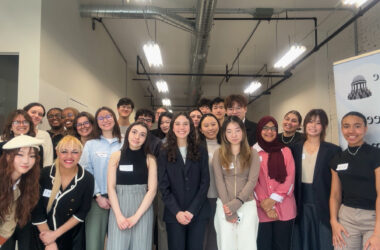McGill Women In Leadership (MWIL) and the McGill Pre-Law Students’ Society (MPLSS) joined forces on Jan. 26 to host a panel about women in law featuring prominent lawyers and legal scholars from across Canada. During the event, panellists discussed the proudest moments of their careers, the challenges of being a woman in law, and the advice they would offer to future lawyers in the audience.
MWIL’s vice-president (VP) Events, Lis Riveros, U1 Arts, sat down with the Tribune to discuss the motivation behind this event and the importance of connecting future lawyers with other women in the field.
“Between me and the VP Events for McGill Pre-Law, we agreed that in order for women to advocate for themselves and move their careers forward, they can’t succeed by doing it alone,” Riveros said. “The idea of being able to succeed in law and having the ability, competence, and eventual affluence of being a lawyer are usually tied to those who are not women.”
The panel featured a diverse range of women in law, including a business owner and practicing criminal defense lawyer, a corporate lawyer, an entertainment lawyer, and a legal scholar. Riveros explained that holding the panel remotely actually enhanced the event because it allowed for more diversity in the speakers they brought in.
“If we did the law panel in person, we could only do Montreal lawyers,” Riveros said. “Zoom and online events give endless opportunities and creativity.”
Riveros highlighted that the goal of this year’s event was to emphasise versatility in law. When planning, it was important for MWIL and MPLSS to include women who were extending the boundaries of their law degree.
For instance, panellist Jordana Goldlist, criminal lawyer and owner of JHG Criminal Law, studied civil litigation before switching to criminal law and eventually starting her own company.
“My biggest accomplishment is my business overall,” Goldlist said. “After five years [at a criminal law firm], I wanted to do things differently. I left on a leap of faith and started my own practice in 2015. I’ve grown a fantastic practice, a great reputation, and it’s nothing but hard work and dedication.”
The speakers were also candid about the ugly side of law and the gender bias that follows many women in the legal field.
Sarit Batner, a corporate lawyer at McCarthy Tétrault in Toronto highlighted how challenging it is for women in law to get their foot in the door.
“The list of challenges that women have to face in law […] is great and long, and if you’re a racialized woman you can add layers to that. What I was most surprised by were lines of referral. You come into law expecting that there’s no gender difference. However, the client sources are still men, the networks are still men, and being excellent is super helpful, […] but [it’s] often not enough.”
Despite the obstacles they have had to overcome throughout their careers, the panel emphasized to the audience that there is great potential to make positive institutional change with a law degree.
Professor Priya S. Gupta at the McGill Faculty of Law explained that the law gave her the knowledge and leverage to address the issues she is most passionate about.
“One of the things I loved [about law school] was how it could teach you to engage in the world, through all these different fields and all these different modes. When you have the things you’re interested in […] the law gives you the profession that allows you to make those changes in the world.”









